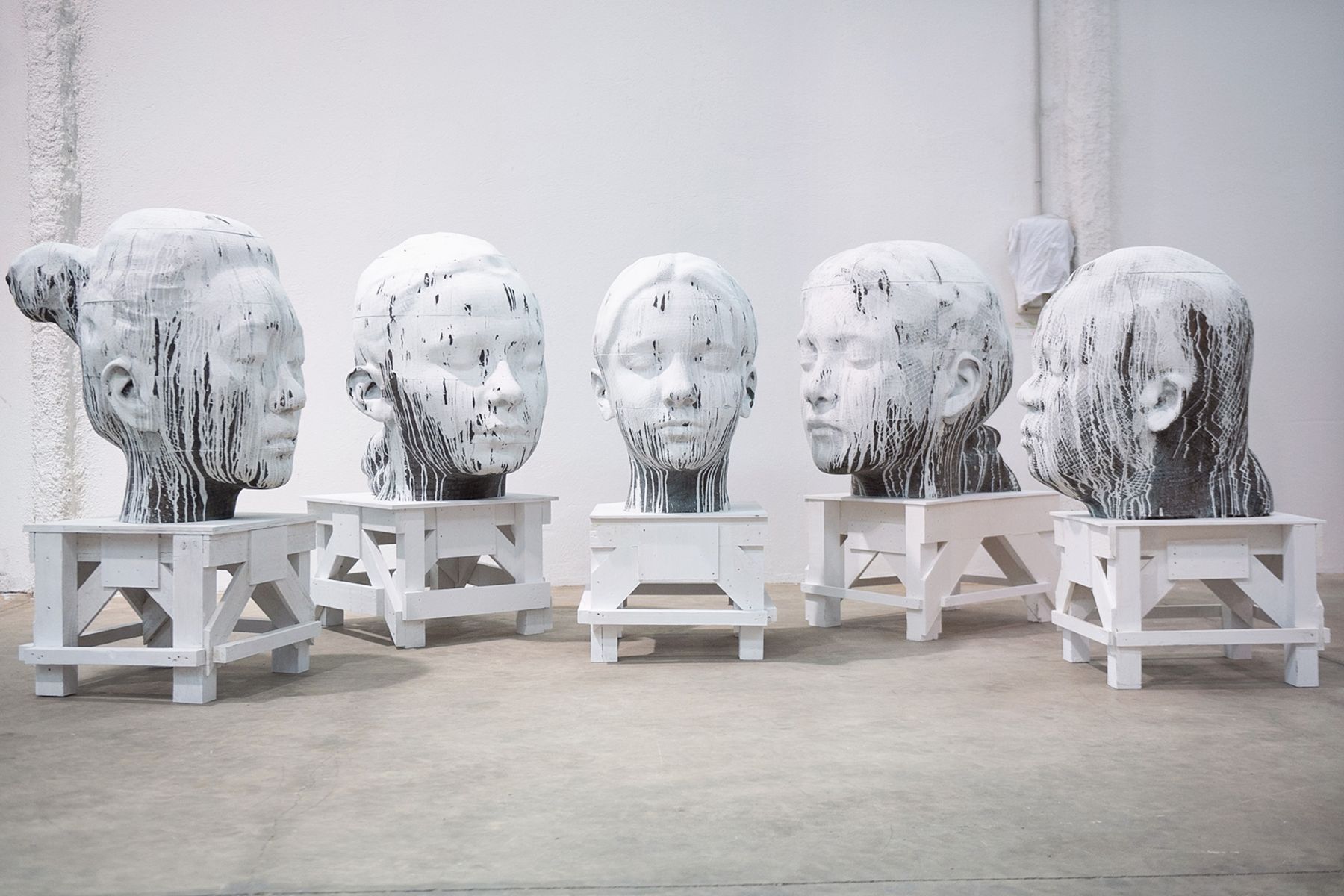
In Nocturne, a word evocative of the night, Plensa navigates the symbolic dichotomy between lightness and darkness. The artist presents his newest body of work in a gradient of material density, beginning with the most substantial sculpture crafted from black basalt and bronze, and concluding with light, ethereal figures in stainless steel and Murano glass. Contemplating the extraordinary challenges of the present day in these terms, Plensa maintains, “no matter how long the night, the morning always comes.” Whether embracing or opposing the intrinsic qualities of his materials, Plensa’s exhibition of sculptural portraits symbolizes the potential for hope to emerge from a place of total darkness.
Commencing the exhibition is Minna, a nine-foot-tall portrait depicting a young woman with her eyes closed in a state of repose. Created from dark basalt stone, Minna is the artist’s largest work in the medium to date. Nocturne continues with a series of five bronze portraits–Anna, Irma, Laura, Lou, and Rui Rui. Arranged closely together as if in silent dialogue, each bronze head presents a uniquely textured surface, the result of being cast from the same molds the artist uses to form his steel mesh figures. Once cast in bronze, Plensa hand-paints the surface of each work with a layer of white, carefully obscuring the original dark finish while elucidating the serene facial features of his subjects.
The two largest works in the exhibition are Plensa’s most ethereal: delicately bent stainless steel wires construct the portraits of Rui Rui and Julia, delineating the faces of Plensa’s subjects while simultaneously wavering in and out of legibility. With deep material awareness, Plensa offers the illusion of a weightless form, fabricating and rendering otherwise monumental works into light, airy apparitions. Through portraiture, Plensa’s sculptures convey the transitory nature of the human condition, capturing his sitters in a single moment in time. As Plensa explains, “Every time I do a portrait, soon after, in a way, the person no longer exists.” The exhibition culminates with Silence, an intimately-scaled portrait made from white Murano glass. Holding a finger to its lips in a gesture of quietude, the figure acts as a coda, concluding Nocturne on a final note of inner tranquility.
Jaume Plensa was born in 1955 in Barcelona, Spain, where he presently lives and works. One of the foremost sculptors in the public realm, Plensa is the recipient of national and international awards including the Honorary Doctorate from Univeristat Aut’onoma de Barcelona (2018) and the Velazquez Prize awarded by the Spanish Cultural Ministry (2013). The artist’s work has been the subject of numerous solo museum exhibitions, including MACBA: Museu d’Art Contemporani de Barcelona, Spain; Museo Nacional Centro de Arte Reina Sofía, Madrid, Spain; MAMC–Musée d’art moderne et contemporain Saint-Étienne Métropole, Saint-Étienne, France; the Venice Biennale; The Toledo Museum of Art, Toledo, Ohio; Yorkshire Sculpture Park, Yorkshire, England; and the Nasher Sculpture Center, Dallas.
Plensa’s prolific career has taken his work across the globe, including celebrated projects in such cities as Toronto, Los Angeles, New York, Calgary, Chicago, Montréal, London, Paris, Bangkok, Shanghai, and Tokyo. Recent public installations of the artist’s monumental sculptures include Dreaming in Toronto’s Richmond Adelaide Centre (2020), Behind the Walls at historic Rockefeller Center in New York City (2018-2019) and the Museo Nacional de Arte in Mexico City (2019-2020), and Voices permanently installed at 30 Hudson Yards in New York City (2018).
Gray Warehouse 875 N Michigan Ave, Ste 3800. Chicago, Il 60611
https://www.richardgraygallery.com/
Image: Nocturne. Gray Warehouse
